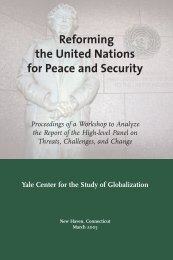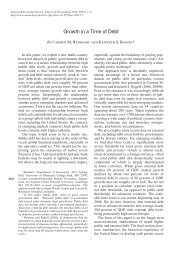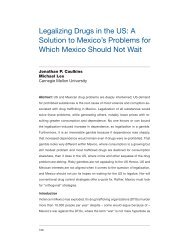The collapse of global trade, murky protectionism, and the crisis:
The collapse of global trade, murky protectionism, and the crisis:
The collapse of global trade, murky protectionism, and the crisis:
Create successful ePaper yourself
Turn your PDF publications into a flip-book with our unique Google optimized e-Paper software.
VOX<br />
Research-based policy analysis <strong>and</strong> commentary from leading economists<br />
raised tariffs on used automobiles, <strong>and</strong> Ecuador raised tariffs on more than 900 items.<br />
Non-tariff measures include Argentina's imposition <strong>of</strong> non-automatic licensing<br />
requirements on auto parts, textiles, TVs, toys, shoes, <strong>and</strong> lea<strong>the</strong>r goods <strong>and</strong><br />
Indonesia's requirement that five categories <strong>of</strong> goods (including garments, footwear,<br />
toys, electronics, food <strong>and</strong> beverages) would be permitted through only five ports <strong>and</strong><br />
airports. In some countries, tightening st<strong>and</strong>ards have slowed import entry. For example,<br />
India banned Chinese toys, <strong>and</strong> China banned imports <strong>of</strong> Irish pork <strong>and</strong> rejected<br />
some Belgian chocolate, Italian br<strong>and</strong>y, British sauce, Dutch eggs <strong>and</strong> Spanish<br />
dairy products.<br />
Export subsidies are particularly egregious because <strong>the</strong>y contravene <strong>the</strong> draft Doha<br />
modalities. <strong>The</strong> EU announced new export subsidies on butter, cheese, <strong>and</strong> milk powder.<br />
Less obviously, both China <strong>and</strong> India have increased <strong>the</strong> rebate on <strong>the</strong> duty drawback<br />
system for exporters, <strong>and</strong>, although <strong>the</strong> subsidy component is a matter <strong>of</strong> discussion,<br />
<strong>the</strong> timing <strong>of</strong> <strong>the</strong>se measures raises questions.<br />
Subsidies proposed for <strong>the</strong> auto industry have proliferated <strong>and</strong> total some $48 billion<br />
worldwide, mostly in high-income countries ($42.7 billion). In addition to <strong>the</strong><br />
US direct subsidy <strong>of</strong> $17.4 billion to its three national companies, Canada, France,<br />
Germany, <strong>the</strong> UK, China, Argentina, Brazil, Sweden <strong>and</strong> Italy have also provided<br />
direct or indirect subsidies – not including Australia's support to its car dealers <strong>and</strong><br />
South Korea's <strong>and</strong> Portugal's support to <strong>the</strong>ir component suppliers. To <strong>the</strong> extent that<br />
<strong>the</strong> industry is laden with excess capacity, <strong>the</strong>se subsidies impede exit <strong>and</strong> delay<br />
adjustment. Even worse, subsidies may be linked to requirements that companies preserve<br />
domestic employment, even at <strong>the</strong> cost <strong>of</strong> shutting more efficient plants abroad<br />
in developing countries. (President Sarkozy reportedly proposed that Renault <strong>and</strong><br />
Peugeot-Citroen shut plants in <strong>the</strong> Czech Republic to maintain employment in<br />
France as part <strong>of</strong> its €6 billion package.) Moreover, to prevent this, governments have<br />
had to react to <strong>the</strong> policies <strong>of</strong> neighbours -Canada has matched <strong>the</strong> subsidies given to<br />
Detroit automakers to ensure that Canadian plants <strong>of</strong> American producers remain<br />
open.<br />
A remarkable trend emerging from <strong>the</strong>se actions is <strong>the</strong> reliance <strong>of</strong> developed countries<br />
on subsidies ra<strong>the</strong>r than border barriers, while developing countries have<br />
deployed all forms <strong>of</strong> protection. This undoubtedly is testimony to <strong>the</strong> superior financial<br />
strength <strong>of</strong> public budgets in developed countries. However, once economic pressures<br />
to stimulate economies are replaced with <strong>the</strong> inevitable need to reduce deficits,<br />
this pattern may portend equally severe pressures to wall <strong>of</strong>f <strong>trade</strong> competition.<br />
Antidumping cases are on <strong>the</strong> rise<br />
After a period <strong>of</strong> slowdown, <strong>the</strong> number <strong>of</strong> antidumping cases (both investigations<br />
initiated <strong>and</strong> imposition <strong>of</strong> duties) surged in 2008, especially in <strong>the</strong> second semester.<br />
Compared to 2007, antidumping initiations grew by 15% <strong>and</strong> findings with imposition<br />
<strong>of</strong> duties grew by 22%. Developing countries accounted for <strong>the</strong> majority <strong>of</strong> initiations,<br />
though developed countries accounted for <strong>the</strong> greatest number <strong>of</strong> duty<br />
impositions. India was <strong>the</strong> most active, accounting for 29% <strong>of</strong> total initiations. In<br />
December alone, India initiated anti-dumping investigations involving both hot- <strong>and</strong><br />
cold- rolled stainless steel products, affecting 19 countries. In addition to Japan, three<br />
developing countries – China, South Africa, <strong>and</strong> Thail<strong>and</strong> – were <strong>the</strong> target in both<br />
investigations. <strong>The</strong> US <strong>and</strong> EU were <strong>the</strong> two countries that most frequently imposed<br />
duties. For example, <strong>the</strong> EU in December 2008 imposed duties on preserved fruits<br />
50





